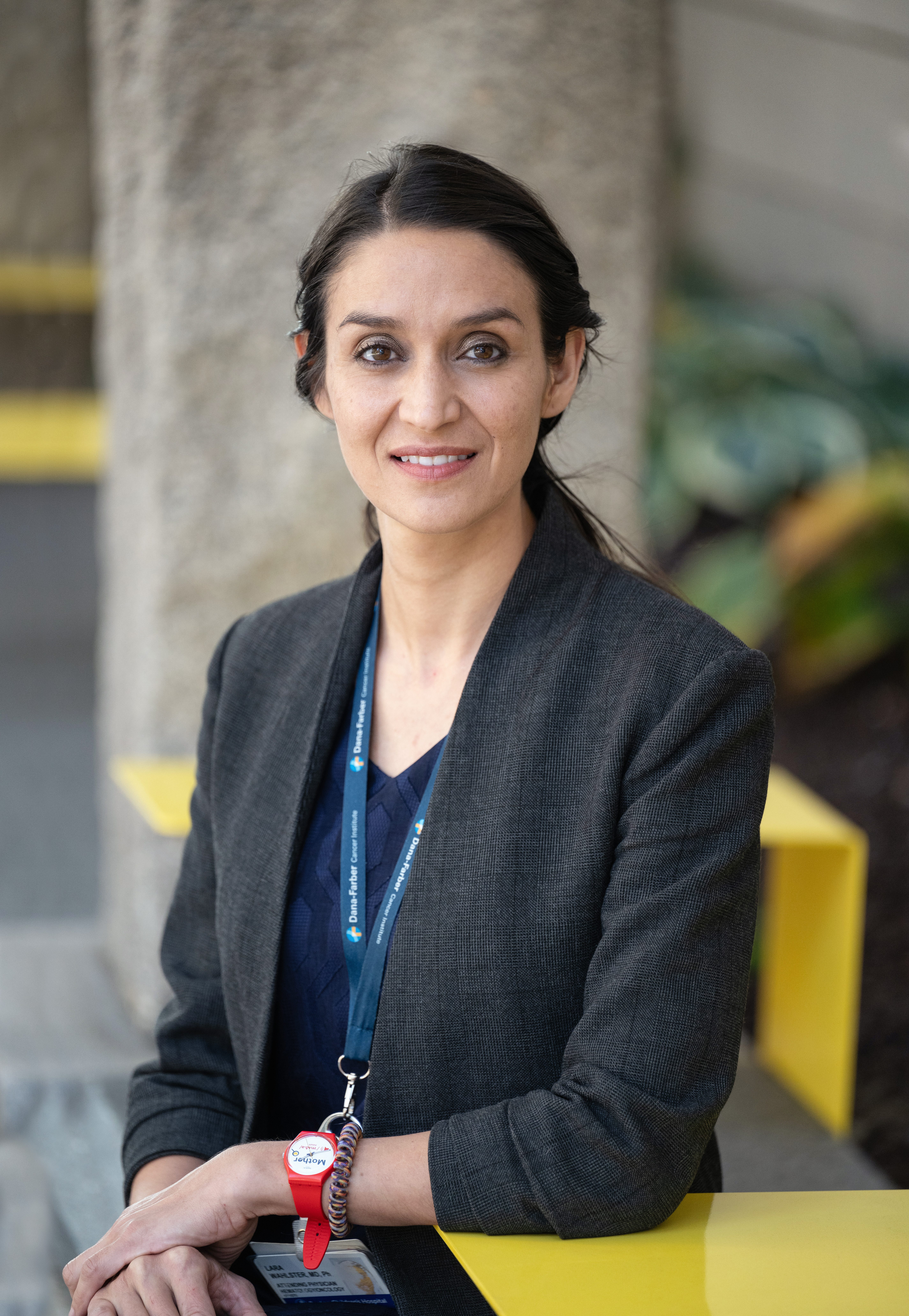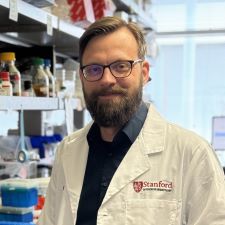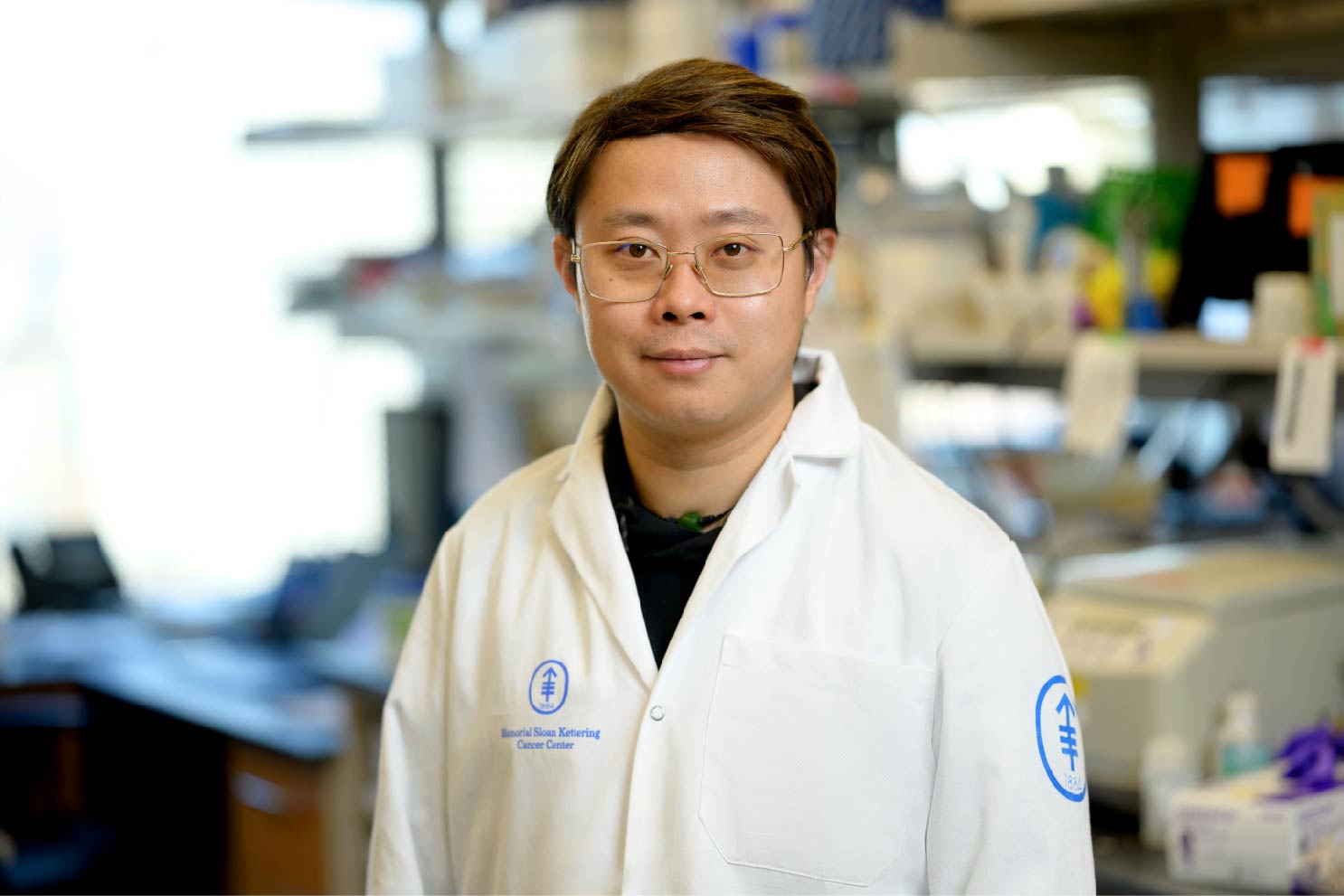Up to 50% of patients with acute myeloid leukemia (AML) have a genetic alteration called DNA methylation, in which a carbon methyl group is added to the DNA molecule, typically turning the methylated gene "off." A mainstay of therapy is the use of hypomethylating agents, which prevent copying of these modifications during cell division, but this therapy is effective in only 20-30% of patients. Using chemical and genetic manipulation in mouse bone marrow, Dr. Viny [Damon Runyon-Doris Duke Clinical Investigator] aims to determine the effect of DNA methylation on the ability of specific regions of the genome to be accessible to proteins involved with gene expression and other regions to be inaccessible and "silenced." In a prospective phase II clinical trial, he will treat relapsed AML patients with dual hypomethylating agents. By studying these patients' genetic profiles, he aims to determine the genetic features that contribute to therapy response, paving the way for more effective interventions to be developed for patients with acute myeloid leukemia. Dr. Viny was previously a Damon Runyon Fellow.
Blood Cancers
Current Projects

Dr. Wahlster is studying the developmental origins of acute lymphoblastic leukemia (ALL), the most common childhood cancer and leading cause of death in children. The goal of Dr. Wahlster’s research is to understand the biological processes that drive blood cancer development. Applying innovative genomic tools, her work seeks to decipher how cancer-predisposing genetic variants impact early blood cell development and facilitate the acquisition of secondary genetic changes found in ALL. She aims to leverage these insights to guide the development of novel, mechanism-based treatments. Dr. Wahlster earned her MD and PhD from the University of Heidelberg, Heidelberg.

Dr. Weeks [Damon Runyon-Timmerman Traverse Clinical Investigator] plans to develop computerized models that can review images of blood cells and predict a patient’s risk of developing acute myeloid leukemia. Because computers can capture small changes in images better than humans looking at cells under a microscope, such a model could connect data about the shapes and appearance of blood cells to the presence of pre-leukemia genetic changes known as clonal hematopoiesis. This work will inform the extent to which blood cell appearance is associated with the underlying biology of leukemia and Pre-leukemia. Ultimately, Dr. Weeks aims to refine existing models of leukemia risk prediction and pave the way for screening programs that can identify individuals with clonal hematopoiesis who are at the highest risk for progressing to cancer.

Certain cancers of the blood are treated by transplanting stem cells that can regenerate all kinds of blood cells from healthy donors. Even though this procedure has the potential to cure the cancer, common complications such as bloodstream infections or graft-versus-host disease (when the body rejects the donor cells) can lead to major side effects and even death. There is substantial evidence that these complications are linked to the microbes residing in the gut, collectively termed the gut microbiome, but the exact mechanism for this interaction is unknown. To address this knowledge gap, Dr. Wirbel will study how the genomes of gut microbes change over time in a large cohort of blood stem cell transplantation patients, using modern DNA sequencing techniques and developing novel analyses pipelines. He will then investigate whether the genes that are changing in microbial genomes might influence the human immune system and thereby contribute to these clinical complications.
Dr. Wirbel plans to develop a computational tool for the reference-free analysis of microbial genomes over time based on long-read sequencing. By comparing newly assembled genomes across different sampling time points, the tool will detect structural variation (deletion or insertions into the genome) in microbial genomes. Additionally, genomic inversions (“flipping” of the orientation of DNA) and genes associated with these changes will also be identified.

Dr. Zhang is studying a unique three-stranded nucleic acid structure, called an R-loop, to understand its role in cancer development and find ways to target and control its formation. R-loops consist of a DNA-RNA hybrid and a displaced strand of DNA. R-loops occur frequently in human genomes, and while they play an important role in blood cell differentiation and immune cell function, they can also interfere with DNA repair and promote genome instability, giving rise to leukemia. However, the dynamic nature of R-loop formation hampers the detection of this structure in a small cell sample. To address this challenge, Dr. Zhang is developing novel techniques to map R-loops in normal blood stem cells versus blood cancer cells at single-cell resolution. He also plans to investigate leukemia-specific R-loops in vitro and in vivo with CRISPR-based screening techniques. The goal of his research is to aid development of therapeutic interventions for R-loop-related gene expression dysregulation in cancer, especially leukemia. Dr. Zhang received his PhD from Ohio State University, Columbus, his MS from University of Edinburgh, Edinburgh, and his BS from Chongqing University, Chongqing.

Thalidomide derivatives are a mainstay of treatment in multiple myeloma, a cancer of white blood cells called plasma cells. However, around one in ten individuals treated with thalidomide derivatives for multiple myeloma will develop a blood clot, which can be life-threatening. It is critical to determine how to continue to use thalidomide derivatives to kill myeloma cells, while working to understand why these drugs increase the likelihood of clotting. Thalidomide derivatives work by degrading proteins important to myeloma cell growth; Dr. Zon [The Mark Foundation for Cancer Research Physician-Scientist] hypothesizes that these drugs could similarly lead to the degradation of proteins that prevent blood clotting. She is comprehensively evaluating what factors promote blood clots patients with multiple myeloma, with the goal of developing more targeted medications to prevent blood clots and improve treatment outcomes in blood cancer patients.
- « first
- ‹ previous
- 1
- 2
- 3
- 4







